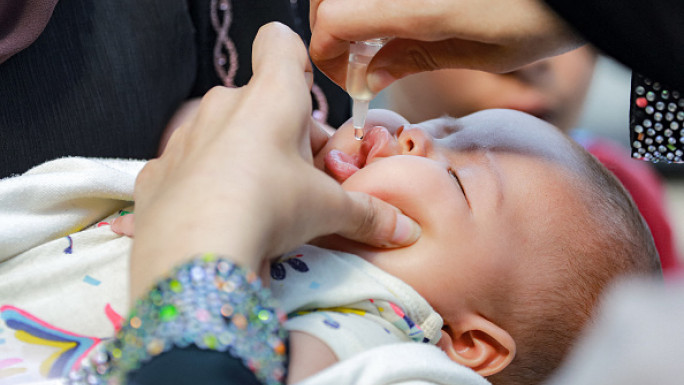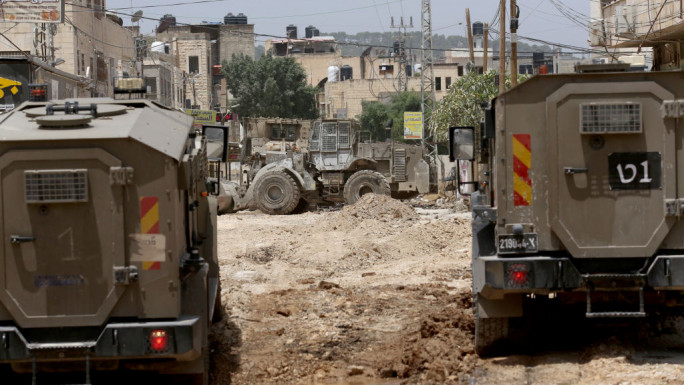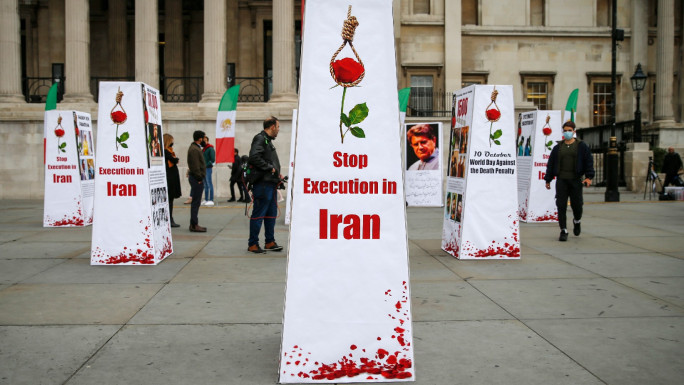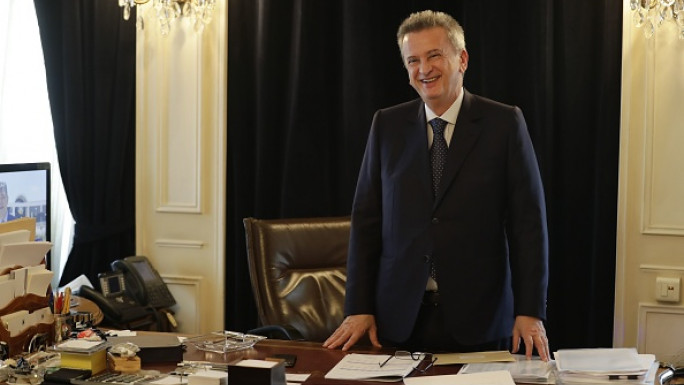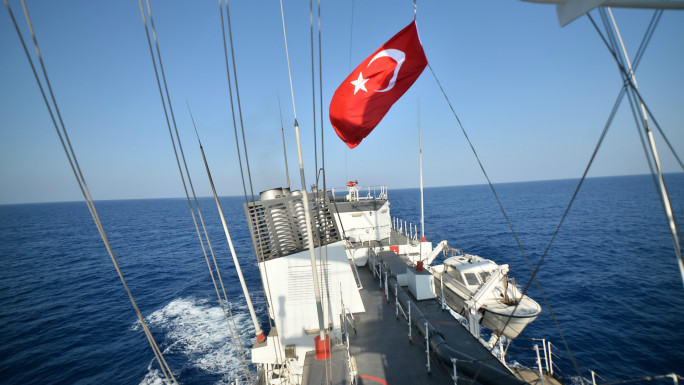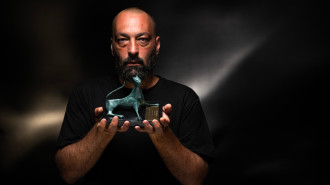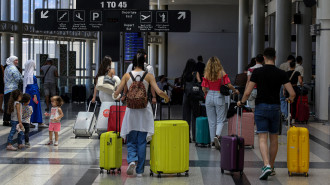
British-Lebanese comedian Isabelle Farah brings Babylonian king Nebuchadnezzar to life at Edinburgh Festival Fringe 2024

What is the correct pronunciation of "Nebuchadnezzar"? It’s a conundrum that provides one of the earliest laughs in Isabelle Farah's promising new comedy hour, named after the infamous Babylonian ruler.
Farah landed on "neh-byuh-kuhd-nih-zaar" when she first read his name in a book. However, she tells The New Arab, "There's always someone in the audience — normally an old white man — who says, 'I think it's actually 'neh-byuh-kuhd-neh-zuh,' and you're like, why? Were you there? Did you hear it?"
It is with that defiant approach that the British-Lebanese actor, writer, and comedian will take Edinburgh Festival Fringe audiences on an irreverent journey back to 605 BC. She offers an alternative history lesson on how King Nebuchadnezzar II (AKA Nobu) expanded the Ancient Babylonian Empire, rebuilt the city of Babylon (modern-day Iraq), and ended up commissioning the legendary Hanging Gardens for his wife, Amytis of Media.
"I was looking for a big character I could hone in on," says Farah. "And with any story, I'm looking for conflict where there's a little bit of tension."
But she was also tired of the broadly negative representation of ancient figures in Middle Eastern history that she was hearing about in history podcasts.
"There was this American one on the Levant, and they were like, 'Well, they killed loads of people because they are Arabs.' I remember switching it off," recalls Farah. "So much of our history is told from this perspective that the Arabs are warmongering, bloodthirsty, bad people."
Ancient kings meet modern comedy
After seeing pictures of Nebuchadnezzar looking like a powerful warrior — with his strong face and thick beard — Farah was sold.
Reading about his exploits added intrigue. Despite his many military campaigns to conquer and plunder neighbouring kingdoms, he was a romantic who built a multi-tiered garden for Amytis to remind her of the floral, forested landscape of her homeland that she missed.
"It blew my mind and got me thinking, what was he like at home?" Farah explains.
"He probably was a massive tyrant, but what can we take from the story, and where can I weasel in? I've done history since I was 16, so there are probably some things that are set in stone. But then none of it really matters when it's comedy," Farah added.
Inspired by Blackadder, Monty Python, and Upstart Crow — as well as Aladdin and Bab al Harra — Farah bolsters her dry wit with tacky props, clever pre-recorded dialogue, and some very amusing repurposing of pop lyrics to tell this classic tale with a contemporary flourish.
She takes on the roles of the king, his queen, and Jeff, a British diplomat supplanted into this point in ancient history to reflect just how often the British have complicated Middle Eastern interests for their own gain.
"I did this show in its earliest form a year ago, and then Gaza started happening," says Farah. "The biggest change is the reaction to the line 'the British aren't gonna sell arms to a despotic Middle Eastern regime.' I wrote it about Saudi Arabia!"
From rejected sitcoms to embracing her heritage
Farah had originally conceived this story as a TV sitcom called Nobu & Amytis, hoping that the appetite for darkly comic period pieces with a strong female lead — like The Great, Harlots, and Mary & George — would appeal to TV commissioners.
But it seems Amytis wasn't the white kind of protagonist when she pitched it to a few broadcasters. "They said, 'Unfortunately, we've already got a female-led satirical ancient thing,'" said Farah. "I was like, 'You're not going to commission another one ever?'"
That sort of rejection is nothing new to the actor, who has struggled to find her place on stage and screen as a woman of mixed heritage.
Her British mother met her Lebanese father while working as a nurse in 80s Beirut during the Lebanese civil war.
"My father was married, and when mum was pregnant with me, she was like, 'Okay, I'm leaving. I'm out.'" Farah was brought up in London with her mother and "very British stepfather," who she's called "dad" ever since but had little connection to her Lebanese family.
Her biological father died when she was 15, and she was only informed a year after the fact. It had a massive impact on her identity. "I went through a big thing in my late teens of being like, 'I'm not Lebanese,'" the comedian recalls.
She rejected her heritage, especially after studying abroad in Senegal for her Film & French degree and witnessing racism in the Lebanese community there. "It was really horrible," she said. "I remember being like, 'Oh my god, hide me. Don't let anyone know.'"
At drama school, she believed she was white-passing enough to get a slew of juicy roles, but after graduating, she realised she was competing with thousands of white actors in their twenties.
"So I ended up auditioning more for Lebanese or Arab parts just as a result of there being a smaller pool," she says.
However, given the dearth of MENA female roles beyond terrorists, devout Muslims, or exotic background characters, it was even more disappointing. "This was not what I trained for; I was not being stretched in any way," says Farah.
The stress of competing with her Middle Eastern and North African actor mates was tough too. "One of them might get a role because she's got a better accent than me or she looks a little bit more Arab, but you realise these are my friends and we're all competing for one or two shit parts in a TV show."
Despite the reductive and negative stereotypes in the casting calls she would answer, it helped Farah discover more affection for her Arab heritage.
Reading My Father's Daughter — British-Eritrean journalist Hannah Azieb Pool's memoir about meeting her birth family — also helped to change her perspective and understand her connection to Lebanon doesn't have to be tainted by familial drama. "I went into a bit of a hole for two weeks after reading it," says Farah. "I didn't think I could ignore this much longer."
A journey of culture, loss, and laughter
So she did something drastic. Aged 29, she moved to Lebanon to learn about the culture and "embrace it as part of me."
In Beirut, she performed and workshopped stand-up shows that catered to progressive Lebanese sensibilities. "The day-to-day in Lebanon is power cuts and financial struggle, so talking about my quite mundane life in London doesn't work."
Her sex life proved a hit with some rather "excitable 22-year-old feminists on the front row" of her sets, Farah remembers. The time there gave her the confidence to pursue stand-up as a way to play the lead.
Her first comedy show, Ellipse, charted the year following her cousin's suicide in 2017. It was a hit at Edinburgh Festival Fringe, the sort of subject matter that Farah says, cynically, does well at the annual arts festival but not without a personal cost.
"It sort of pains me that my most successful work has come from my greatest loss, but it meant a lot to a lot of people," she admits.
Her second show, Irresponsabelle, grappled with the more relatable Millennial experience of being 36 and single. "I turned 35 in the pandemic, and I didn't know if I'd ever meet anyone or if I'd ever have children," says Farah.
The irony that she is now in a relationship and pregnant with her first child is not lost on the comedian, but she doesn't want that to be the focus in Nebuchadnezzar. "I would like to walk on stage and be funny about something and someone and not be baring my soul," she says.
Instead, Farah hopes to challenge preconceived notions about Arabs and the Middle East with a laugh and a giggle. "If I can have a few people go, 'Do you know what? We didn't know about that. Was he a big tyrant? Are these Arabs actually tyrants like that?' I'd like to raise questions," she says. "Fringe is a big beast, but when you get good audiences, it's magical. And if someone wants to commission it — Great!"
Isabelle Farah: Nebuchadnezzar is playing until August 25th at Assembly George Square Studios, Studio Five, during Edinburgh Festival Fringe 2024.
Hanna Flint is a film and TV critic, writer and author of Strong Female Character with bylines at Empire, Time Out, Elle, Town & Country, the Guardian, BBC Culture and IGN
Follow her here: @HannaFlint
